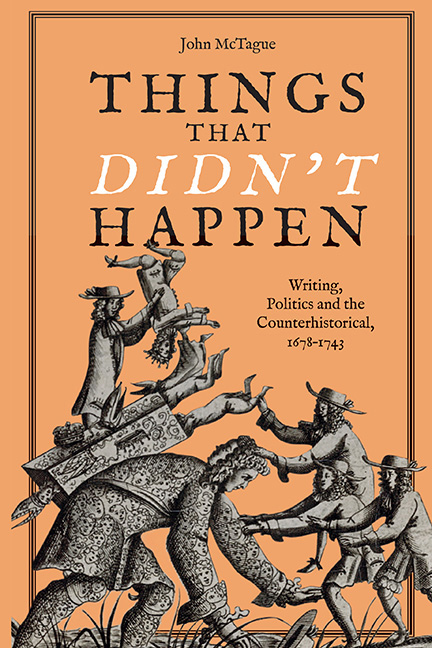Book contents
- Frontmatter
- Dedication
- Contents
- List of Illustrations
- Acknowledgements
- List of Abbreviations
- Introduction
- I Fabrications
- II Failures
- 3 Travesties: The Assassination and Insurrection Plots of 1683
- 4 Contingency and Incontinence: The Jacobite Invasion of 1708
- III Speculations
- IV The Dunciads
- Conclusion: Events that Didn't Happen
- Bibliography
- Index
4 - Contingency and Incontinence: The Jacobite Invasion of 1708
from II - Failures
Published online by Cambridge University Press: 09 October 2019
- Frontmatter
- Dedication
- Contents
- List of Illustrations
- Acknowledgements
- List of Abbreviations
- Introduction
- I Fabrications
- II Failures
- 3 Travesties: The Assassination and Insurrection Plots of 1683
- 4 Contingency and Incontinence: The Jacobite Invasion of 1708
- III Speculations
- IV The Dunciads
- Conclusion: Events that Didn't Happen
- Bibliography
- Index
Summary
ON 12 March, 1708, the Earl of Mar wrote a letter from Whitehall, addressed to George Erskine at his estate at Alloa in Clackmannanshire, Scotland. That evening, a French invasion fleet arrived near Crail on the north side of the Firth of Forth. James Francis Edward Stuart was on board, and the fleet's mission was to restore him as King of Scots by raising an insurrection in Scotland, ideally landing its 5,000 troops near Edinburgh and taking the castle. The earl's instructions in this moment of national insecurity are as follows:
I'm affraid before this come to your hand that you have heard of the French landing. E'er long there will be such a force sent against them that they and their associats will not be able to stand before; but I'm affraid our poor country and particular persons suffer. […] The furnitur of the house is not so pratious that I'm much affraid of it, so take not down one bitt of it, but the looss things in the house of any worth, as linning or so, put into the chartur-house or some other sure place which I think better, except a few which you wou'd keep out in case any of my friends chance to come and ly there. […] There are armes in the closet of the cross vault, which you wou'd cause clean and give them out to the prittiest fellows of the toun who you can trust most, and they wou'd keep some kind of guard on the house to prevent it being pilaged or burnt by any loose partie. […] I wish you cou'd get the cannon which are in the chartur buried, but it must be done privatly.
Mar's proprietorial concern for his ‘looss things’ is articulated in a letter that moves between assurance and alarm, and which in its mixture of tenses also reflects the ways in which this failed invasion provoked counterhistorical speculations both pro- and retro-spective. In the first place, Mar is required to write towards a contingent future.
- Type
- Chapter
- Information
- Things that Didn't HappenWriting, Politics and the Counterhistorical, 1678–1743, pp. 111 - 138Publisher: Boydell & BrewerPrint publication year: 2019



